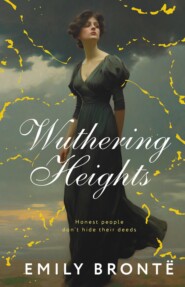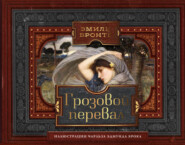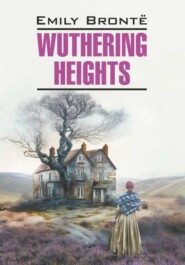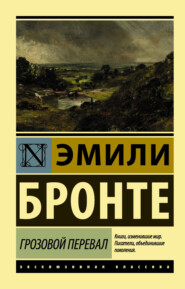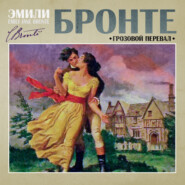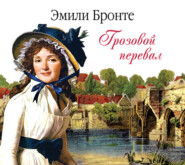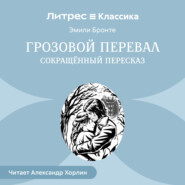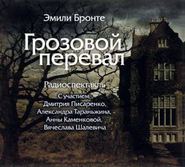По всем вопросам обращайтесь на: info@litportal.ru
(©) 2003-2024.
✖
Лучшие романы сестер Бронте / The best of the Brontë sisters
Настройки чтения
Размер шрифта
Высота строк
Поля
“No, indeed!” I interjected.
“Ah! that pricks pride. Well, fetch me your portfolio, if you can vouch for its contents being original; but don’t pass your word unless you are certain: I can recognise patchwork.”
“Then I will say nothing, and you shall judge for yourself, sir.”
I brought the portfolio from the library.
“Approach the table,” said he; and I wheeled it to his couch. Ad?le and Mrs. Fairfax drew near to see the pictures.
“No crowding,” said Mr. Rochester: “take the drawings from my hand as I finish with them; but don’t push your faces up to mine.”
He deliberately scrutinised each sketch and painting. Three he laid aside; the others, when he had examined them, he swept from him.
“Take them off to the other table, Mrs. Fairfax,” said he, “and look at them with Ad?le; – you” (glancing at me) “resume your seat, and answer my questions. I perceive those pictures were done by one hand: was that hand yours?”
“Yes.”
“And when did you find time to do them? They have taken much time, and some thought.”
“I did them in the last two vacations I spent at Lowood, when I had no other occupation.”
“Where did you get your copies?”
“Out of my head.”
“That head I see now on your shoulders?”
“Yes, sir.”
“Has it other furniture of the same kind within?”
“I should think it may have: I should hope – better.”
He spread the pictures before him, and again surveyed them alternately.
While he is so occupied, I will tell you, reader, what they are: and first, I must premise that they are nothing wonderful. The subjects had, indeed, risen vividly on my mind. As I saw them with the spiritual eye, before I attempted to embody them, they were striking; but my hand would not second my fancy, and in each case it had wrought out but a pale portrait of the thing I had conceived.
These pictures were in water-colours. The first represented clouds low and livid, rolling over a swollen sea: all the distance was in eclipse; so, too, was the foreground; or rather, the nearest billows, for there was no land. One gleam of light lifted into relief a half-submerged mast, on which sat a cormorant, dark and large, with wings flecked with foam; its beak held a gold bracelet set with gems, that I had touched with as brilliant tints as my palette could yield, and as glittering distinctness as my pencil could impart. Sinking below the bird and mast, a drowned corpse glanced through the green water; a fair arm was the only limb clearly visible, whence the bracelet had been washed or torn.
The second picture contained for foreground only the dim peak of a hill, with grass and some leaves slanting as if by a breeze. Beyond and above spread an expanse of sky, dark blue as at twilight: rising into the sky was a woman’s shape to the bust, portrayed in tints as dusk and soft as I could combine. The dim forehead was crowned with a star; the lineaments below were seen as through the suffusion of vapour; the eyes shone dark and wild; the hair streamed shadowy, like a beamless cloud torn by storm or by electric travail. On the neck lay a pale reflection like moonlight; the same faint lustre touched the train of thin clouds from which rose and bowed this vision of the Evening Star.
The third showed the pinnacle of an iceberg piercing a polar winter sky: a muster of northern lights reared their dim lances, close serried, along the horizon. Throwing these into distance, rose, in the foreground, a head, – a colossal head, inclined towards the iceberg, and resting against it. Two thin hands, joined under the forehead, and supporting it, drew up before the lower features a sable veil, a brow quite bloodless, white as bone, and an eye hollow and fixed, blank of meaning but for the glassiness of despair, alone were visible. Above the temples, amidst wreathed turban folds of black drapery, vague in its character and consistency as cloud, gleamed a ring of white flame, gemmed with sparkles of a more lurid tinge. This pale crescent was “the likeness of a kingly crown;” what it diademed was “the shape which shape had none[40 - the likeness of a kingly crown, the shape which shape had none – from “Paradise Lost” by John Milton (1608–1674) where Raphael describes Death to Adam.].”
“Were you happy when you painted these pictures?” asked Mr. Rochester presently.
“I was absorbed, sir: yes, and I was happy. To paint them, in short, was to enjoy one of the keenest pleasures I have ever known.”
“That is not saying much. Your pleasures, by your own account, have been few; but I daresay you did exist in a kind of artist’s dreamland while you blent and arranged these strange tints. Did you sit at them long each day?”
“I had nothing else to do, because it was the vacation, and I sat at them from morning till noon, and from noon till night: the length of the midsummer days favoured my inclination to apply.”
“And you felt self-satisfied with the result of your ardent labours?”
“Far from it. I was tormented by the contrast between my idea and my handiwork: in each case I had imagined something which I was quite powerless to realise.”
“Not quite: you have secured the shadow of your thought; but no more, probably. You had not enough of the artist’s skill and science to give it full being: yet the drawings are, for a school-girl, peculiar. As to the thoughts, they are elfish. These eyes in the Evening Star you must have seen in a dream. How could you make them look so clear, and yet not at all brilliant? for the planet above quells their rays. And what meaning is that in their solemn depth? And who taught you to paint wind? There is a high gale in that sky, and on this hill-top. Where did you see Latmos[41 - Latmos – Mount Latmus; according to Greek legends, it was the place where the moon goddess Selene first met Endymion, a mortal who became her lover.]? For that is Latmos. There! put the drawings away!”
I had scarce tied the strings of the portfolio, when, looking at his watch, he said abruptly –
“It is nine o’clock: what are you about, Miss Eyre, to let Ad?le sit up so long? Take her to bed.”
Ad?le went to kiss him before quitting the room: he endured the caress, but scarcely seemed to relish it more than Pilot would have done, nor so much.
“I wish you all good-night, now,” said he, making a movement of the hand towards the door, in token that he was tired of our company, and wished to dismiss us. Mrs. Fairfax folded up her knitting: I took my portfolio: we curtseyed to him, received a frigid bow in return, and so withdrew.
“You said Mr. Rochester was not strikingly peculiar, Mrs. Fairfax,” I observed, when I rejoined her in her room, after putting Ad?le to bed.
“Well, is he?”
“I think so: he is very changeful and abrupt.”
“True: no doubt he may appear so to a stranger, but I am so accustomed to his manner, I never think of it; and then, if he has peculiarities of temper, allowance should be made.”
“Why?”
“Partly because it is his nature – and we can none of us help our nature; and partly because he has painful thoughts, no doubt, to harass him, and make his spirits unequal.”
“What about?”
“Family troubles, for one thing.”
“But he has no family.”
“Not now, but he has had – or, at least, relatives. He lost his elder brother a few years since.”
“His elder brother?”
“Yes. The present Mr. Rochester has not been very long in possession of the property; only about nine years.”
“Nine years is a tolerable time. Was he so very fond of his brother as to be still inconsolable for his loss?”
“Why, no – perhaps not. I believe there were some misunderstandings between them. Mr. Rowland Rochester was not quite just to Mr. Edward; and perhaps he prejudiced his father against him. The old gentleman was fond of money, and anxious to keep the family estate together. He did not like to diminish the property by division, and yet he was anxious that Mr. Edward should have wealth, too, to keep up the consequence of the name; and, soon after he was of age, some steps were taken that were not quite fair, and made a great deal of mischief. Old Mr. Rochester and Mr. Rowland combined to bring Mr. Edward into what he considered a painful position, for the sake of making his fortune: what the precise nature of that position was I never clearly knew, but his spirit could not brook what he had to suffer in it. He is not very forgiving: he broke with his family, and now for many years he has led an unsettled kind of life. I don’t think he has ever been resident at Thornfield for a fortnight together, since the death of his brother without a will left him master of the estate; and, indeed, no wonder he shuns the old place.”
“Why should he shun it?”
“Perhaps he thinks it gloomy.”
The answer was evasive. I should have liked something clearer; but Mrs. Fairfax either could not, or would not, give me more explicit information of the origin and nature of Mr. Rochester’s trials. She averred they were a mystery to herself, and that what she knew was chiefly from conjecture. It was evident, indeed, that she wished me to drop the subject, which I did accordingly.
“Ah! that pricks pride. Well, fetch me your portfolio, if you can vouch for its contents being original; but don’t pass your word unless you are certain: I can recognise patchwork.”
“Then I will say nothing, and you shall judge for yourself, sir.”
I brought the portfolio from the library.
“Approach the table,” said he; and I wheeled it to his couch. Ad?le and Mrs. Fairfax drew near to see the pictures.
“No crowding,” said Mr. Rochester: “take the drawings from my hand as I finish with them; but don’t push your faces up to mine.”
He deliberately scrutinised each sketch and painting. Three he laid aside; the others, when he had examined them, he swept from him.
“Take them off to the other table, Mrs. Fairfax,” said he, “and look at them with Ad?le; – you” (glancing at me) “resume your seat, and answer my questions. I perceive those pictures were done by one hand: was that hand yours?”
“Yes.”
“And when did you find time to do them? They have taken much time, and some thought.”
“I did them in the last two vacations I spent at Lowood, when I had no other occupation.”
“Where did you get your copies?”
“Out of my head.”
“That head I see now on your shoulders?”
“Yes, sir.”
“Has it other furniture of the same kind within?”
“I should think it may have: I should hope – better.”
He spread the pictures before him, and again surveyed them alternately.
While he is so occupied, I will tell you, reader, what they are: and first, I must premise that they are nothing wonderful. The subjects had, indeed, risen vividly on my mind. As I saw them with the spiritual eye, before I attempted to embody them, they were striking; but my hand would not second my fancy, and in each case it had wrought out but a pale portrait of the thing I had conceived.
These pictures were in water-colours. The first represented clouds low and livid, rolling over a swollen sea: all the distance was in eclipse; so, too, was the foreground; or rather, the nearest billows, for there was no land. One gleam of light lifted into relief a half-submerged mast, on which sat a cormorant, dark and large, with wings flecked with foam; its beak held a gold bracelet set with gems, that I had touched with as brilliant tints as my palette could yield, and as glittering distinctness as my pencil could impart. Sinking below the bird and mast, a drowned corpse glanced through the green water; a fair arm was the only limb clearly visible, whence the bracelet had been washed or torn.
The second picture contained for foreground only the dim peak of a hill, with grass and some leaves slanting as if by a breeze. Beyond and above spread an expanse of sky, dark blue as at twilight: rising into the sky was a woman’s shape to the bust, portrayed in tints as dusk and soft as I could combine. The dim forehead was crowned with a star; the lineaments below were seen as through the suffusion of vapour; the eyes shone dark and wild; the hair streamed shadowy, like a beamless cloud torn by storm or by electric travail. On the neck lay a pale reflection like moonlight; the same faint lustre touched the train of thin clouds from which rose and bowed this vision of the Evening Star.
The third showed the pinnacle of an iceberg piercing a polar winter sky: a muster of northern lights reared their dim lances, close serried, along the horizon. Throwing these into distance, rose, in the foreground, a head, – a colossal head, inclined towards the iceberg, and resting against it. Two thin hands, joined under the forehead, and supporting it, drew up before the lower features a sable veil, a brow quite bloodless, white as bone, and an eye hollow and fixed, blank of meaning but for the glassiness of despair, alone were visible. Above the temples, amidst wreathed turban folds of black drapery, vague in its character and consistency as cloud, gleamed a ring of white flame, gemmed with sparkles of a more lurid tinge. This pale crescent was “the likeness of a kingly crown;” what it diademed was “the shape which shape had none[40 - the likeness of a kingly crown, the shape which shape had none – from “Paradise Lost” by John Milton (1608–1674) where Raphael describes Death to Adam.].”
“Were you happy when you painted these pictures?” asked Mr. Rochester presently.
“I was absorbed, sir: yes, and I was happy. To paint them, in short, was to enjoy one of the keenest pleasures I have ever known.”
“That is not saying much. Your pleasures, by your own account, have been few; but I daresay you did exist in a kind of artist’s dreamland while you blent and arranged these strange tints. Did you sit at them long each day?”
“I had nothing else to do, because it was the vacation, and I sat at them from morning till noon, and from noon till night: the length of the midsummer days favoured my inclination to apply.”
“And you felt self-satisfied with the result of your ardent labours?”
“Far from it. I was tormented by the contrast between my idea and my handiwork: in each case I had imagined something which I was quite powerless to realise.”
“Not quite: you have secured the shadow of your thought; but no more, probably. You had not enough of the artist’s skill and science to give it full being: yet the drawings are, for a school-girl, peculiar. As to the thoughts, they are elfish. These eyes in the Evening Star you must have seen in a dream. How could you make them look so clear, and yet not at all brilliant? for the planet above quells their rays. And what meaning is that in their solemn depth? And who taught you to paint wind? There is a high gale in that sky, and on this hill-top. Where did you see Latmos[41 - Latmos – Mount Latmus; according to Greek legends, it was the place where the moon goddess Selene first met Endymion, a mortal who became her lover.]? For that is Latmos. There! put the drawings away!”
I had scarce tied the strings of the portfolio, when, looking at his watch, he said abruptly –
“It is nine o’clock: what are you about, Miss Eyre, to let Ad?le sit up so long? Take her to bed.”
Ad?le went to kiss him before quitting the room: he endured the caress, but scarcely seemed to relish it more than Pilot would have done, nor so much.
“I wish you all good-night, now,” said he, making a movement of the hand towards the door, in token that he was tired of our company, and wished to dismiss us. Mrs. Fairfax folded up her knitting: I took my portfolio: we curtseyed to him, received a frigid bow in return, and so withdrew.
“You said Mr. Rochester was not strikingly peculiar, Mrs. Fairfax,” I observed, when I rejoined her in her room, after putting Ad?le to bed.
“Well, is he?”
“I think so: he is very changeful and abrupt.”
“True: no doubt he may appear so to a stranger, but I am so accustomed to his manner, I never think of it; and then, if he has peculiarities of temper, allowance should be made.”
“Why?”
“Partly because it is his nature – and we can none of us help our nature; and partly because he has painful thoughts, no doubt, to harass him, and make his spirits unequal.”
“What about?”
“Family troubles, for one thing.”
“But he has no family.”
“Not now, but he has had – or, at least, relatives. He lost his elder brother a few years since.”
“His elder brother?”
“Yes. The present Mr. Rochester has not been very long in possession of the property; only about nine years.”
“Nine years is a tolerable time. Was he so very fond of his brother as to be still inconsolable for his loss?”
“Why, no – perhaps not. I believe there were some misunderstandings between them. Mr. Rowland Rochester was not quite just to Mr. Edward; and perhaps he prejudiced his father against him. The old gentleman was fond of money, and anxious to keep the family estate together. He did not like to diminish the property by division, and yet he was anxious that Mr. Edward should have wealth, too, to keep up the consequence of the name; and, soon after he was of age, some steps were taken that were not quite fair, and made a great deal of mischief. Old Mr. Rochester and Mr. Rowland combined to bring Mr. Edward into what he considered a painful position, for the sake of making his fortune: what the precise nature of that position was I never clearly knew, but his spirit could not brook what he had to suffer in it. He is not very forgiving: he broke with his family, and now for many years he has led an unsettled kind of life. I don’t think he has ever been resident at Thornfield for a fortnight together, since the death of his brother without a will left him master of the estate; and, indeed, no wonder he shuns the old place.”
“Why should he shun it?”
“Perhaps he thinks it gloomy.”
The answer was evasive. I should have liked something clearer; but Mrs. Fairfax either could not, or would not, give me more explicit information of the origin and nature of Mr. Rochester’s trials. She averred they were a mystery to herself, and that what she knew was chiefly from conjecture. It was evident, indeed, that she wished me to drop the subject, which I did accordingly.







